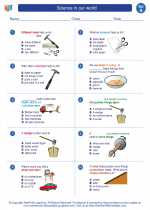Nucleic Acids
Nucleic acids are macromolecules that are essential for the storage and expression of genetic information. There are two main types of nucleic acids: deoxyribonucleic acid (DNA) and ribonucleic acid (RNA).
Structure of Nucleic Acids
DNA and RNA are made up of nucleotides, which consist of a sugar molecule (deoxyribose in DNA and ribose in RNA), a phosphate group, and a nitrogenous base. The nitrogenous bases in DNA are adenine (A), thymine (T), cytosine (C), and guanine (G), while in RNA, thymine is replaced by uracil (U).
Function of Nucleic Acids
DNA contains the genetic instructions for the development, functioning, growth, and reproduction of all known organisms. It is passed from parents to offspring and is responsible for heredity. RNA plays a crucial role in protein synthesis, gene regulation, and the transmission of genetic information from DNA to the ribosomes where proteins are synthesized.
Study Guide for Nucleic Acids
- What are the two main types of nucleic acids?
- What are the components of a nucleotide?
- What are the nitrogenous bases present in DNA?
- What is the function of DNA?
- What is the role of RNA in the cell?
[Nucleic Acids] Related Worksheets and Study Guides:
.◂Science Worksheets and Study Guides First Grade. Science in our world

 Worksheet/Answer key
Worksheet/Answer key
 Worksheet/Answer key
Worksheet/Answer key
 Worksheet/Answer key
Worksheet/Answer key
 Vocabulary/Answer key
Vocabulary/Answer key
 Vocabulary/Answer key
Vocabulary/Answer key
